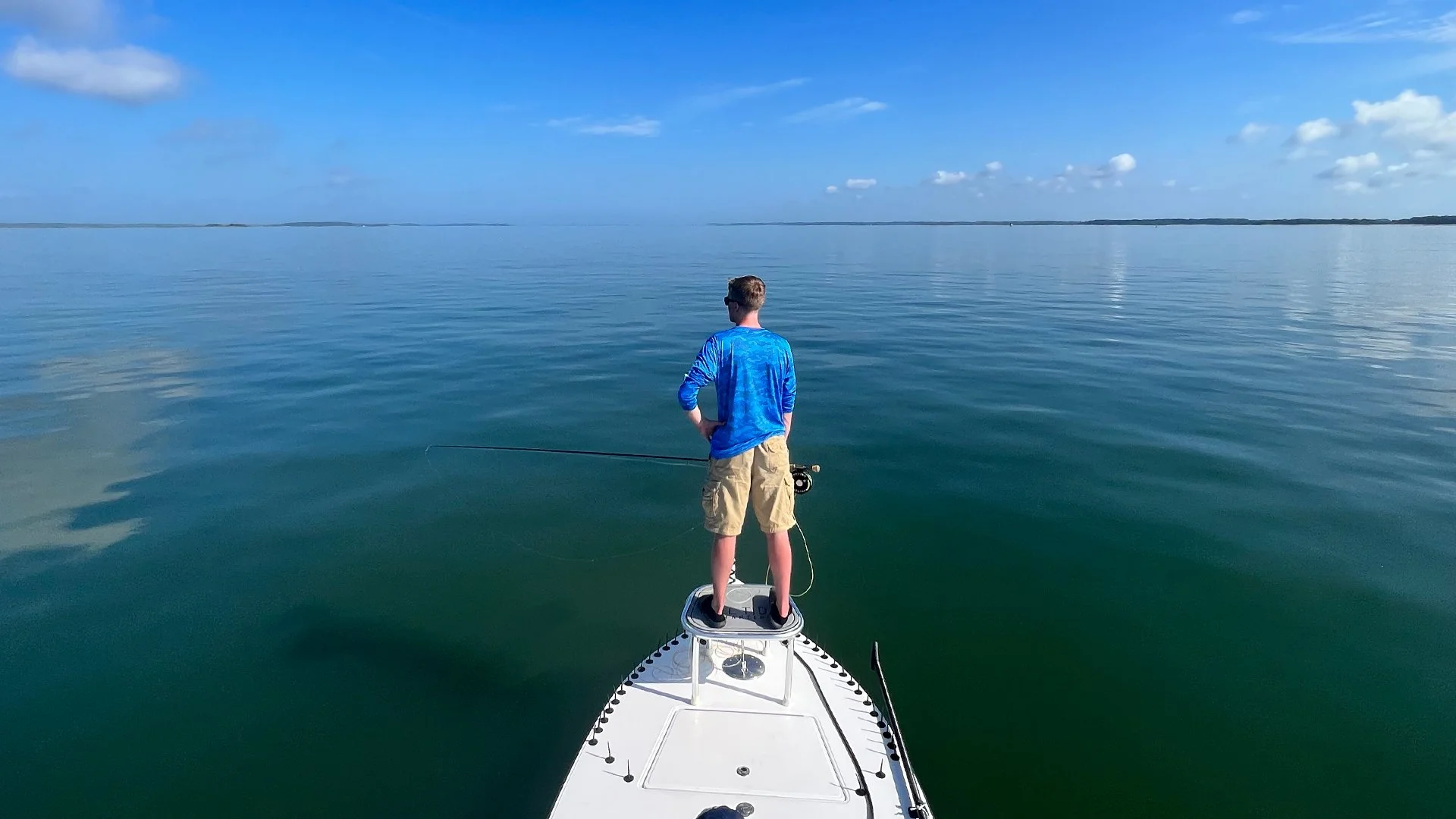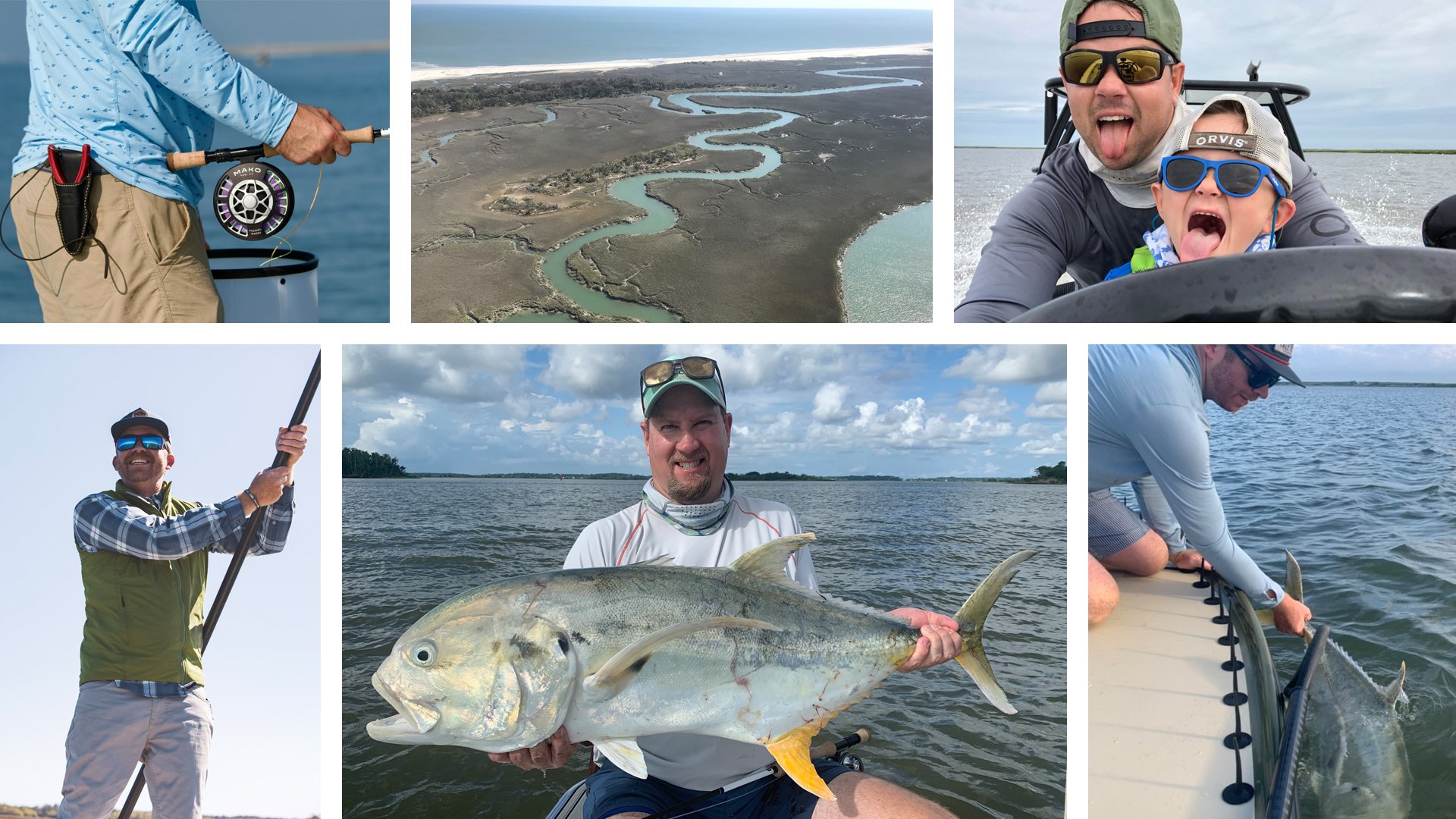
Savannah, Georgia Tarpon Fishing
Fish Savannah, Tybee Island, Bluffton, Richmond Hill, and Pooler, GA Lowcountry for tarpon. Anglers of all abilities welcome.
Savannah Tarpon Fishing
Tarpon are the heavyweight champions of the inshore world. Known for their explosive takes, aerial acrobatics, and pure power, these migratory fish offer one of the most exciting experiences in all of saltwater fishing. Along the Georgia coast, we have a seasonal window from June through September when tarpon move into the larger rivers, sounds, and bays around Savannah, Tybee Island, Bluffton, Richmond Hill, and Pooler as part of their annual migration.
These fish are big. Most Georgia tarpon range from 60 to 120 pounds, although larger fish are not uncommon. They come here to feed on mullet, menhaden, and other baitfish that school up in the sounds and creek mouths during the summer. Tarpon in our area are typically caught rolling near the surface, daisy-chaining in the tide lines, or blowing up bait balls with unmistakable violence.
Light Tackle Fishing for Tarpon
Fishing for tarpon with conventional gear around Savannah opens up a wider range of tactics and opportunities than fly fishing does. These fish respond well to both natural and artificial offerings depending on their mood and the conditions.
We primarily throw large swimbaits, paddletails, or soft-plastic jerkbaits on heavy jig heads when fish are feeding aggressively. Occasionally, live bait like mullet, pogies, or pinfish are used when fishing artificial lures is not an option. Circle hooks (when applicable) and fluorocarbon leaders are employed to improve hook sets and reduce wear on the fish.
A typical day chasing tarpon may start at first light, scanning for rolling fish in the sounds or river mouths. We’ll quietly idle into range, drift or anchor depending on the setup, and wait for our moment. Sometimes it’s all about patience. Other days, it’s run-and-gun while chasing moving fish and intercepting with fast, accurate casts. When a tarpon eats all chaos ensues-long runs, multiple jumps, and a tug-of-war that can break the spirit of both fish and angler.
Tarpon fishing is challenging, intense, physical, and addicting, and Savannah is one of the most overlooked places to do it.
Fly Fishing for Tarpon
Fly fishing for tarpon in the Georgia Lowcountry is not easy, but it’s worth every bit of the effort. These are large, smart fish that will test the abilities of all levels of fly anglers. But when it comes together, few moments in fly fishing compare.
We typically fish 11- or 12-weight rods with floating lines, strong leaders, and large baitfish (profile) flies that push water and can be seen by fish in murky water. Black-and-purple, chartreuse-and-white, and mullet-imitating patterns are common.
Tarpon often travel in strings or pods, cruising shorelines, channels, or structure edges. Presenting a fly ahead of the lead fish and letting it intercept naturally is key. Most shots happen on calm mornings or slick tides when fish are near the surface. It’s a game of spotting rollers, setting up quietly, and making the cast count.
Tarpon on fly in Savannah is for committed anglers with good eyes, strong casting skills, the patience to wait for the right moment, and the ability to make it happen (or at least have a good time learning when it doesn’t).
Savannah Tarpon Fishing Seasons
Tarpon are migratory, so we only get a few solid months each year to target them in Georgia waters.
Early Season (June): First arrivals start to show in the sounds and around bait schools. These early fish are fresh and eager. Great time to throw flies and soft plastics.
Peak Season (July–August): This is when the bulk of the fish are in the area. Big schools move through, bait is thick, and the conditions are usually calm. Best chance for both fly and conventional success.
Late Season (September): Fish start to thin out, but the ones that remain are typically large and hungry. Cooler nights and lighter pressure can lead to excellent days for those willing to look.
Off-Season (October–May): Tarpon are gone, chasing warmer water farther south. During this time, we focus on resident species like redfish.
Savannah Tarpon Fishing Charter Details
Tall Tides Charters offers full day, half day, and specialty light tackle and fly fishing charters for tarpon out of Savannah, Tybee Island, Bluffton, Richmond Hill, and Pooler, GA. Multiple boats are available for groups of more than 2 people. Contact us for current rates and availability. All trips include GA and SC fishing licenses, tackle, fuel costs, launch fees, and a cooler with water and ice.
Payments And Deposits
Cash, Check or Venmo.
$150 per day per guide deposit for all trips
Venmo or mail deposits to:
Tall Tides Charters
438 E 51st St.
Savannah, GA 31405
What To Bring
Polarized sunglasses (amber, copper, and green lenses preferred)
Hat and any needed sun protection
Quick drying conditions appropriate clothing
Rain gear, jackets and pants
Shoes with non-marking soles
Booking/Cancellation Policy
We take safety seriously. Our Captain’s will use their discretion during times of adverse conditions. Any cancellations made by the Captain can be rescheduled or refunded entirely. Deposits are due at time of booking. Final payments are due by the date of trip. Bookings are non-refundable and any cancelled days will result in a credit that can be used within one year of original booking date.
More Target Species: Redfish and Jack Crevalle
Redfish
Redfish (Red Drum) are the staple of our inshore fishery. Year-round residents, they can be targeted in all seasons with artificial lures and fly crawling on flood tide grass flats, swimming creeks and shorelines, and schooled up in the deeper rivers and bays. Summer and fall is is considered prime time, with aggressive eats and fish pushing double digits in the creeks and rivers.
Jack Crevalle
Jack Crevalle show up when the water heats up, and when they do, they bring chaos. It’s not uncommon to see large schools of jacks hammering bait on the surface of the deeper rivers and bays of the Savannah area. These fish are hungry, fast, powerful, and love a well-placed topwater plug or streamer. When hooked, jacks make long runs and pound for pound fight as hard as any fish that swims.

















